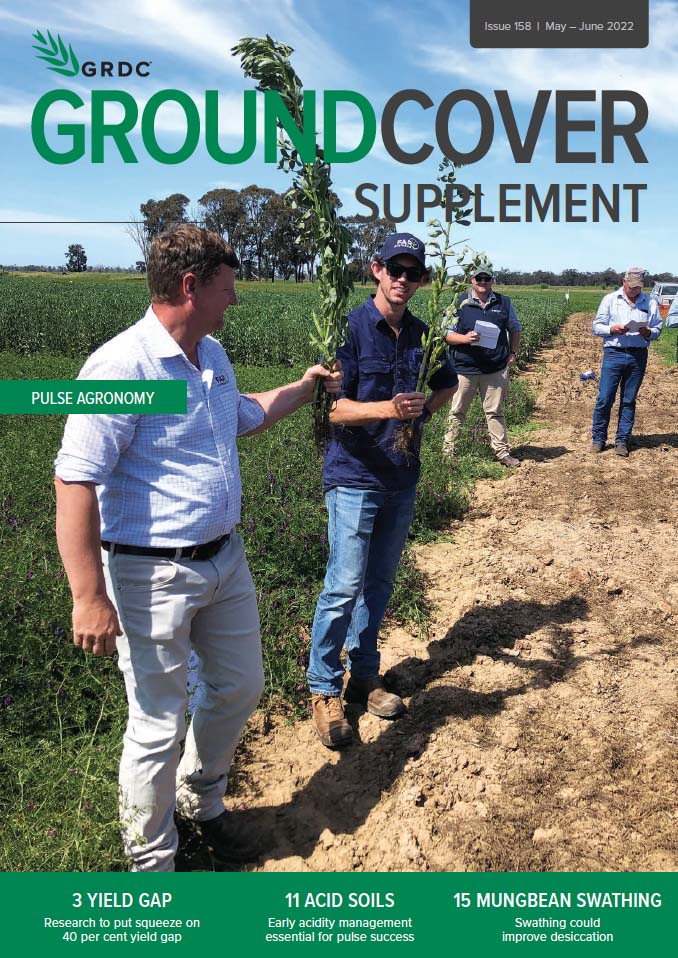This page shows the articles in of GroundCover.
GroundCover is also distributed every two months via mail. If you would like to subscribe to receive the hardcopy magazine, visit our subscription page.
Download supplement-

Opportunity for summer legumes in Victoria
Supplement: Pulse Agronomy, May-June 2022 - 21 05 2022Existing summer crop options are limited for growers in the southern region who want to take advantage of sporadic summer rainfall events. Researchers have found potential for high-value pulse production in the Victorian high-rainfall zone and irrigation areas.
-

Care worth more than precision in seeding pulses
Supplement: Pulse Agronomy, May-June 2022 - 20 05 2022Trials showed precision seeding improved plant spacing and stand uniformity; however, yields were not consistently better than with conventional seeding.
-

Can companion cropping improve fallow efficiency?
Supplement: Pulse Agronomy, May-June 2022 - 19 05 2022Cover crops are commonly used in Queensland to protect bare soil and improve the amount of fallow rainfall captured for use by the next crop. Companion cropping – growing wheat with chickpeas – may have potential to better protect soils and improve fallow efficiency.
-

Turning necessity into opportunity with summer chickpeas
Supplement: Pulse Agronomy, May-June 2022 - 18 05 2022Converting a cover crop into a cash crop was an opportunity too good to miss for Drew Penberthy and fellow growers in the Narrabri region of NSW. Wet harvests are a recurring challenge in the northern region and can lead to severe wheel track damage that needs to be repaired and then covered.
-

Swathing could improve mungbean desiccation
Supplement: Pulse Agronomy, May-June 2022 - 17 05 2022Newer, more vigorous mungbean varieties are making it more difficult to achieve successful chemical desiccation. Mechanical desiccation – or swathing – could provide an effective alternative. Initial research has shown mechanical desiccation resulted in faster dry down and earlier harvest.
-

Expanding the opportunities for pulse weed control
Supplement: Pulse Agronomy, May-June 2022 - 16 05 2022New novel herbicide tolerance traits are eagerly anticipated to help manage challenging issues such as volunteer vetch in lentil and field pea crops. Potential new lentil varieties will add a second tolerance to existing imidazoline tolerance.
-

Peer-to-peer learning propelled lentil leap
Supplement: Pulse Agronomy, May-June 2022 - 15 05 2022Making the decision to try out a new crop like lentil is never easy, but Mannum grower, Matt Starick, says local knowledge he got from talking with other growers in his Pulse Check discussion group gave him the confidence he needed.
-

Early acidity management essential for pulse success
Supplement: Pulse Agronomy, May-June 2022 - 14 05 2022Soil acidity is an increasing issue across South Australia’s cropping zone. Prompt amelioration is necessary to prevent the development of sub-surface acidity which that limits the growth of pulse and legume crops.
-

Fungicide timing essential for chocolate spot
Supplement: Pulse Agronomy, May-June 2022 - 12 05 2022Recent crop disease surveys found that chocolate spot was all too common in faba bean crops in South Australia and Victoria. Field trials have demonstrated the yield benefit of selecting more resistant varieties and optimising fungicide application timing.
-

Bacteria versus fungus – fighting Ascochyta carryover on stubble
Supplement: Pulse Agronomy, May-June 2022 - 07 05 2022A new approach to managing Ascochyta blight in chickpeas aims to reduce the disease build up outside of the cropping season. As part of this approach, researchers at CSIRO are evaluating microbial inoculants with the ability to control Ascochyta rabiei.


























































